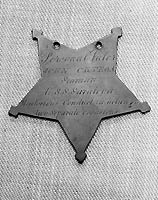Medal of Honor
Medal of Honor
The Medal of Honor is the United States of America's highest and most prestigious personal military decoration that may be awarded to recognize U.S. military service members who have distinguished themselves by acts of valor. The medal is normally awarded by the President of the United States in the name of the U.S. Congress. Because of this, it is sometimes referred to as the "Congressional Medal of Honor". However, the official name is simply the "Medal of Honor".
History[edit | edit source]
The Medal of Honor was created during the American Civil War and was signed into law by President Abraham Lincoln on July 12, 1862. It was first awarded to six Union Army volunteers on March 25, 1863. Since then, the medal has been awarded to more than 3,500 individuals. The design and criteria for the medal have evolved over time. Originally, there were separate Navy and Army versions of the Medal of Honor, but in 1965, a single design for all branches of the military was adopted.
Criteria[edit | edit source]
The Medal of Honor is awarded to members of the armed forces who distinguish themselves "conspicuously by gallantry and intrepidity at the risk of their own lives above and beyond the call of duty" while engaged in an action against an enemy of the United States. Due to the nature of this medal, it is often awarded posthumously.
Appearance[edit | edit source]
The Medal of Honor has undergone several design changes since its inception. The current medal, which is a gold star surrounded by laurel leaves, hangs from a light blue neckband with 13 white stars. The design differs slightly between the Army, Navy, Air Force, and Coast Guard, with each service having its own version of the medal.
Notable Recipients[edit | edit source]
Many Medal of Honor recipients have become well-known figures, such as Alvin C. York, Audie Murphy, and Desmond D. Doss. Their acts of bravery and sacrifice have been celebrated in books, movies, and documentaries, contributing to the legacy of the medal and its importance in American military history.
Controversies[edit | edit source]
Over the years, there have been controversies surrounding the Medal of Honor, including instances of revocation, restoration, and questions about the awarding process. Despite these controversies, the Medal of Honor remains a symbol of the highest ideals of military service and personal courage.
Legacy[edit | edit source]
The Medal of Honor has a significant place in American culture and military tradition. Numerous monuments, museums, and educational programs are dedicated to honoring the recipients of the medal and educating the public about their valorous deeds. The Medal of Honor Day, observed annually on March 25, is a time to remember and celebrate the recipients of the nation's highest military honor.
This article is a United States military stub. You can help WikiMD by expanding it!
Search WikiMD
Ad.Tired of being Overweight? Try W8MD's physician weight loss program.
Semaglutide (Ozempic / Wegovy and Tirzepatide (Mounjaro / Zepbound) available.
Advertise on WikiMD
|
WikiMD's Wellness Encyclopedia |
| Let Food Be Thy Medicine Medicine Thy Food - Hippocrates |
Translate this page: - East Asian
中文,
日本,
한국어,
South Asian
हिन्दी,
தமிழ்,
తెలుగు,
Urdu,
ಕನ್ನಡ,
Southeast Asian
Indonesian,
Vietnamese,
Thai,
မြန်မာဘာသာ,
বাংলা
European
español,
Deutsch,
français,
Greek,
português do Brasil,
polski,
română,
русский,
Nederlands,
norsk,
svenska,
suomi,
Italian
Middle Eastern & African
عربى,
Turkish,
Persian,
Hebrew,
Afrikaans,
isiZulu,
Kiswahili,
Other
Bulgarian,
Hungarian,
Czech,
Swedish,
മലയാളം,
मराठी,
ਪੰਜਾਬੀ,
ગુજરાતી,
Portuguese,
Ukrainian
Medical Disclaimer: WikiMD is not a substitute for professional medical advice. The information on WikiMD is provided as an information resource only, may be incorrect, outdated or misleading, and is not to be used or relied on for any diagnostic or treatment purposes. Please consult your health care provider before making any healthcare decisions or for guidance about a specific medical condition. WikiMD expressly disclaims responsibility, and shall have no liability, for any damages, loss, injury, or liability whatsoever suffered as a result of your reliance on the information contained in this site. By visiting this site you agree to the foregoing terms and conditions, which may from time to time be changed or supplemented by WikiMD. If you do not agree to the foregoing terms and conditions, you should not enter or use this site. See full disclaimer.
Credits:Most images are courtesy of Wikimedia commons, and templates, categories Wikipedia, licensed under CC BY SA or similar.
Contributors: Prab R. Tumpati, MD





